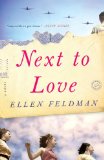Book Club Discussion Questions
In a book club? Subscribe to our Book Club Newsletter and get our best book club books of 2025!
Please be aware that this discussion guide will contain spoilers!
- For nine years, Babe keeps a terrible secret. How much of a toll do you think it takes on her? Does her hardscrabble background make her tougher than Grace and Millie in the face of adversity?
- In the post WWII era, combat fatigue, or what we now call Post Traumatic Stress Disorder, was a dark secret. There was little therapy, and no support groups existed. Do you think in that era Babe could have found better ways to cope with Claude’s problems? Should she have insisted they have a child? How much do you think she regrets not having one? Would you have blamed her if she left him?
- Grace and Millie have diametrically opposite reactions to losing their husbands, and both think they are trying to protect their children. Do you think they really believed that or were they merely justifying their own predilections? What effect does Grace’s behavior have on her daughter Amy? What does Millie’s have on her son Jack?
- Is Grace really so devoted to Charlie’s memory or is she afraid of a new relationship? What does her breakdown in the front yard say about her feelings toward her late husband and herself?
- Is Millie callous or a fierce survivor? Do you see her as a manipulative wife and mother or a woman trying to protect her family?
- In an era that regarded misfortune as something to be ashamed of and silent suffering as a virtue, all three women keep secrets from husbands, children, and one another. Our own era believes in openness as a cure, or at least a form of solace. Do you think Babe, Grace, and Millie would have had an easier time of it if they had shared their problems and unhappiness?
- Grace’s father-in-law King often behaves badly, resenting and punishing vets who returned from the war. Can you sympathize with his heartbreak and loss nonetheless? What does the sexual advice he gives Grace say about the mores and beliefs of the era?
- The psychiatrist tells Grace the solution to her problem is a husband. Were you surprised at how hidebound America was at the time or do you think in many ways –- race, religion, gender, sex -- we have not changed as much as we think?
- How do you interpret the triangle of Grace, Mac, and Morris? Do you think they would behave differently today? What would you have done in Grace’s place after she married Morris?
- This is a book about three women who are friends from childhood, but their friendship is occasionally rocky. Do you think the recent spate of books and movies about women’s friendship romanticize the relationship as we used to romanticize men-women relationships?
- Babe was a poor girl who married into the middle class. Both of Grace’s husbands had plenty of money. After the war, Millie’s husband Al makes a small fortune. Yet their lives remain in many way similar. They have cleaning women but not staffs of maids, nannies, and drivers. They shop, but not excessively. What do you think this says about the beginning of the most prosperous period in America’s history and our own era?
Unless otherwise stated, this discussion guide is reprinted with the permission of Spiegel & Grau.
Any page references refer to a USA edition of the book, usually the trade paperback version, and may vary in other editions.
